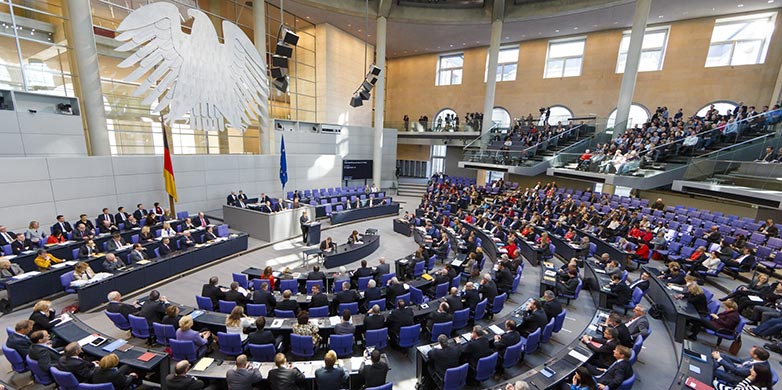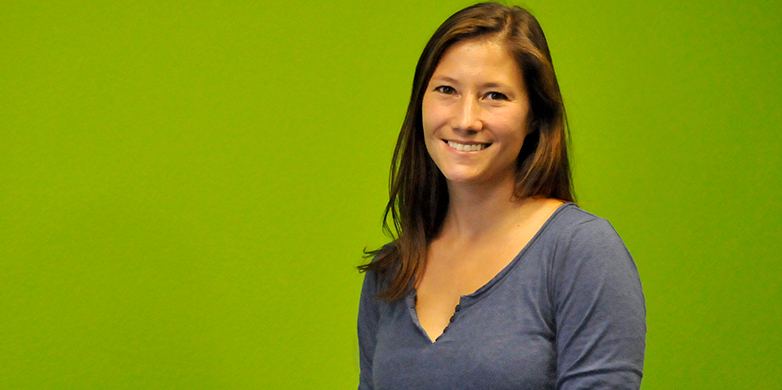How a research visit abroad can enrich your thesis
Tamaki Ohmura is a doctoral student working for the Assistant Professor for Global Governance. Thanks to a mobility grant from the Swiss National Science Foundation (SNSF), she has worked in the US. The SNSF will be presenting its funding programmes at the Research Day at ETH Zurich on 26 November 2014.
The subject of Tamaki Ohmura's research is parliaments. From her office at Haldeneggsteig, she studies how members of parliament behave when it comes to voting. For example, what effect does the election system have on the decision-making of individual members of parliament? Do politicians behave differently, depending on how and by whom they were elected? Do they have a stronger sense of loyalty to a local or a national electorate or do they strictly follow their party line?
Tamaki Ohmura is looking at these questions with the help of voting data from the German Bundestag (parliament). She is a doctoral student in the group headed up by Stefanie Bailer, Assistant Professor for Global Governance at ETH Zurich.
Germany's mixed electoral system
Germany elects the members of the Bundestag by two separate processes: half of them are elected locally by majority voting in, currently 299 constituencies, while the other half are elected by proportional representation on the basis of party lists in the different regions of the country. The Swiss also use two different systems, but these apply separately to the two chambers: in the Council of States, the upper house, seats are allocated according to the majority of the votes per candidate, whereas in the National Council, the lower house, they are allocated on the basis of the proportion of voters for each party in the cantons.
"Historically, the mixed voting system is still relatively young. It was first used in Germany in 1949. That's why we have data going back the furthest for that country. However, in the meantime other countries are also using various different forms of the mixed voting system. I am interested in how the actual decision-making behaviour of individual members of parliament differs in a mixed voting system from that in a pure system," explains Tamaki Ohmura. She is expecting to complete her doctoral thesis project next year.
Voting behaviour in free votes
In her analysis of the voting data, she is paying particular attention to so-called conscience votes, or free votes. These relate to legislation which has a moral element, such as that to regulate abortion, euthanasia or stem cell research. Normally, party discipline is waived for this kind of vote, which means that the usual expectations for individual voting behaviour do not apply. Although these are subjects that are of great importance to society, there has so far been little research into how decisions are reached in such areas.
Tamaki Ohmura still has a lot of work to do before completing her thesis: in cooperation with researchers working on a project financed by the Thyssen Foundation, she has collected all the data on roll-call, or recorded, votes since 1949. In collecting, evaluating and interpreting data from the Bundestag and institutional data about the electoral system, she relies strongly on the sharing of information internationally with political science researchers at the universities of Bamberg and Konstanz.
With a Doc.Mobility grant to San Diego
From the second year of their doctorate onwards, doctoral students at Swiss universities can apply to the Swiss National Science Foundation (SNSF) for a Doc.Mobility grant if they are thinking of spending some time researching abroad. Tamaki Ohmura decided that she definitely wanted to study with a specialist in different methods of comparative parliamentary research.
She knew from various other researchers that Kaare Strøm, Professor of Political Science at the University of California in San Diego, was not only one of the most innovative researchers in his field, but that he also attached a great deal of importance to supporting his visiting doctoral students.
"I wanted to study with Kaare Strøm, because he is one of the leading parliamentary researchers and therefore attracts doctoral students who are interested in that field of research to his institution," says Tamaki Ohmura. "The sharing of ideas and the in-depth discussion about people's various theses in his doctoral seminars were enormously fruitful for me." She spent six months in San Diego (with Doc.Mobility, you can spend between 6 and 18 months researching abroad).
Well-prepared in advance
Initially, Tamaki Ohmura had to adapt in some ways, because doctorates in San Diego are organised differently from the way they are in Zurich and the day-to-day culture is also different. Looking back, she views her time in the US as a very enriching one. It was a big help to her that she had consulted Kaare Strøm early on, before her visit, so that she could enrol in the courses which would be most useful for her research.
In general, concludes Tamaki Ohmura, it was very helpful that she had the opportunity at an early stage to talk to Kaare Strøm about her research at a conference and discuss her visit to San Diego. Then, when she applied for Doc.Mobility, she received Strøm's confirmation quickly and therefore had plenty of time to write her application and brief description of her project for the SNSF. The application procedure itself, she says, is well documented and straightforward, but still time-consuming.
Based on her own experience, Tamaki Ohmura has the following advice: "Find out early on about the options for a visit abroad. Choose a professor who will be a good supervisor. Stay in regular contact with him and other top researchers, and, above all, attend courses that are not available at ETH Zurich."
Research Day at ETH Zurich
Doc.Mobility is one of the funding programmes through which the Swiss National Science Foundation (SNSF) and ETH Zurich provide support for doctoral students and postdocs in their careers. In order to give young researchers an overview of these programmes, they jointly organise the “Research Day” on 26 November.
In the main building of ETH Zurich, experts and researchers will have information stands and present the available funding programmes. The event features presentations and offers the opportunity to ask questions. Following a welcome address by ETH's Vice President Roland Siegwart, Martin Vetterli, President of the Research Council of the SNSF, will speak about «The SNSF and challenges of Swiss Science».
"Research Day is a fantastic opportunity to obtain information first-hand from researchers and course managers," says Wendy Altherr from the Scientific Coordination Office, who helps to organise the event with the SNSF. "Students have the opportunity to do so at the information stands, over the free lunch, during the coffee breaks after the talks and from the presentations on the various different funding programmes in the afternoon."
Further information on the «Research Day»: www.ethz.ch/researchday or external page"The SNSF visits the ETH Zurich"call_made.


